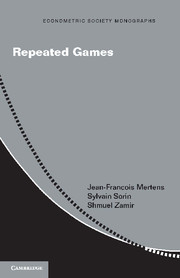Book contents
- Frontmatter
- Contents
- List of Figures
- Foreword
- Preface
- Acknowledgements
- Presentation of the Content
- Part A Background Material
- Part B The Central Results
- Part C Further Developments
- Appendix A Reminder about Analytic Sets
- Appendix B Historical Notes
- Appendix C Bibliography
- Appendix D Updates
- Author Index
- Subject Index
- Miscellaneous Endmatter
Appendix D - Updates
Published online by Cambridge University Press: 05 February 2015
- Frontmatter
- Contents
- List of Figures
- Foreword
- Preface
- Acknowledgements
- Presentation of the Content
- Part A Background Material
- Part B The Central Results
- Part C Further Developments
- Appendix A Reminder about Analytic Sets
- Appendix B Historical Notes
- Appendix C Bibliography
- Appendix D Updates
- Author Index
- Subject Index
- Miscellaneous Endmatter
Summary
COMPLEMENTS AND ADVANCES
This section describes some of the most important developments of the topics treated in the book.
CHAPTER I
Discontinuous games (I.4, Ex. 13 and 20) have been extensively treated starting with Reny (1999) and Jackson et al. (2002); see Reny (2011) for a recent account.
CHAPTER II
II.2.a (and 2.c, Ex. 4). A number of new results concern infinite games with perfect information, including for n players and requiring subgame-perfection; Flesch et al. (2010b), Flesch et al. (2010a), and Purves and Sudderth (2011).
For continuous games, see Harris et al. (1995).
II.2.b Martin's theorem (Theorem II.2.3) has been extended by Martin to Blackwell's games, Martin (1998), to the framework of stochastic games, Maitra and Sudderth (1998, 2003, 2007), Secchi and Sudderth (2001a,b) (see also VII.5), and to eventual perfect monitoring Shmaya (2011).
Section II.3. The concepts of correlated equilibria, extensive form correlated equilibria, and communication equilibria have been used intensively.
Extension to perfection is described in Dhillon and Mertens (1996); computational aspects are in von Stengel and Forges (2008).
Other properties of correlated equilibria can be found in Myerson (1997) and Viossat (2008).
We refer to Forges (2009) for a recent survey.
II.4. Blackwell's theorem (Theorem II.4.1) is of fundamental importance and has numerous applications, including games with incomplete information and learning procedures (in the spirit of II.4., Ex. 7); see, e.g., Hart (2005).
A necessary condition for approachability is given in Spinat (2002). The analysis has been extended to infinite dimensional spaces, Lehrer (2002), to the case of partial monitoring, Rustichini (1999), Cesa-Bianchi et al. (2006), Lehrer and Solan (2007), Perchet (2009), Perchet (2011a,b), to stochastic games, Milman (2006), and to the space of measures, Perchet and Quincampoix (2010).
CHAPTER III
The construction of the universal belief space has been extended and developed in several directions: Dekel et al. (2006), Heifetz and Samet (1998), Meier (2006), and Pinter (2010).
- Type
- Chapter
- Information
- Repeated Games , pp. 548 - 560Publisher: Cambridge University PressPrint publication year: 2015

